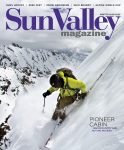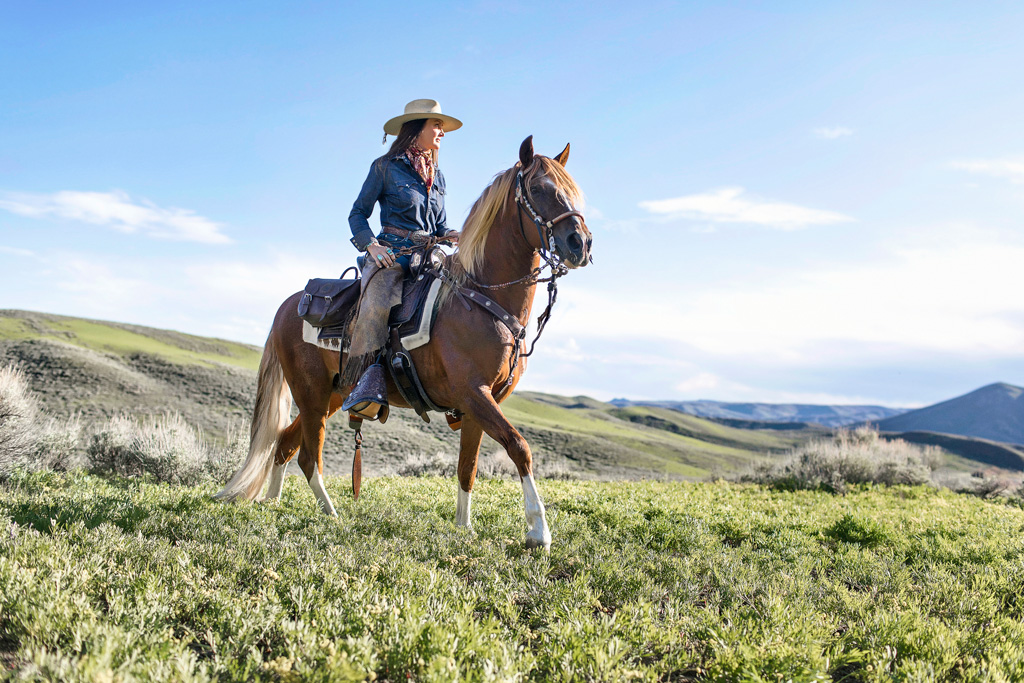“Everything I do is for the love of the horse,” says Nicole Brass, horse trainer for River Grove Ranch in Hailey.
Brass grew up in Jerome, Idaho, where her parents, Forrest and Cheryl Hymas, raised horses and bred Charolais cattle. Nicole’s grandparents settled in the valley in 1910 and their cattle ranch, the Brass Ranch, encompassed what is now Sun Valley and Elkhorn. (Their first house was what is now the Ketchum Grill).
The Brass family sold the ranch in 1936 to Union Pacific Railroad, to build what is now Sun Valley Resort. Nicole’s grandfather, Earnest Brass, once proclaimed that he never expected to see a ski lodge in the middle of his spud field. One of the original barns from the Brass Ranch is the iconic red barn along Sun Valley Road.
For much of her childhood, Brass’ family spent all summer and winter weekends at a cabin in Ketchum. “The cabin was steeped in history through family and filled with stories of Ernest Hemingway,” who rented it out for an extended period of time while he was finishing For Whom The Bell Tolls. “He described it as being ‘across the woods and damn near in the creek,” says Brass.
“I first began riding in a pack on my parents’ backs when I was a baby,” says Brass, “and graduated to my own pony at age three. The first show I participated in was at the Sun Valley Equestrian Center when I was five on my horse, Pistol.”
Brass began showing Arabians at the age of seven, and as her parents began to raise Peruvian Horses in 1972, she also began to show them and she received her first Peruvian Horses sent to her for training when she was just 13.
“During my childhood. I also rode jumpers, ran barrels and was Miss Rodeo Idaho,” says Brass. “I showed reining horses for many years with [American horse trainer] Al Dunning in Arizona. But I still came back every summer to ride Peruvian Horses in the mountains.”
After her twin boys, Dakota and Colton, graduated high school and headed off to play college basketball, Brass moved back to Idaho. “Shortly after I returned to Idaho, Elizabeth Tierney bought River Grove Ranch and asked me to come in as the trainer,” says Brass. “We are now in our fifth year at River Grove Ranch, and we exclusively breed, raise, train, ride in the mountains and show Peruvian Horses.
“Peruvian Horses are a rare breed. They have been selectively bred for over 500 years, and there are only about 12,000 in all of North America,” says Brass. “I am drawn to Peruvian Horses for their smooth gait, temperament, and personalities. They are not horses that take well to being handled with force. And when you earn their trust and respect through patience and consistency, they give and trust with all their heart.”
Brass approaches her work with horses from a “whole horse” perspective, where their mental health is as important as their physical fitness. She explains it is unnatural for horses to stand in a stall all day, so it is important that they are all turned out daily to interact in groups. “I can learn as much about each horse from watching them interact in a herd environment as I can by riding them,” says Brass. “Horses are social animals. It is imperative for their mental health to allow them the ability to interact with other horses. Even our stallions are socialized and not isolated.”
These horses possess such power and athleticism, so to keep them mentally and physically feeling their best, Brass incorporates many different healing modalities such as bodywork, chiropractic, laser, microcurrent, and pulsed electromagnetic therapy (PEMF).
“I could see the results of these therapies first hand last year when one of our horses, Manolo, suffered a devastating injury and shattered his shoulder,” says Brass. “While it was recommended that he be put down, Manolo wasn’t giving up, and neither was I. During the intense months after his injury, I stayed with him 24/7 as he couldn’t be transported to a vet clinic. I treated him continuously with physical therapy, ice boots, laser, and PEMF, among other things, and within nine months, Manolo was able to be ridden again. I attribute his recovery, which was nothing short of miraculous, to his intense desire to survive, his willingness to endure the medical treatments, and constant love and touch. Love can help to heal.”
“I work with horses not to win a ribbon or sell them to make a dollar,” says Brass, “rather, I work with them for the deep satisfaction that comes from forming a true partnership with these magnificent creatures. The more love and time you give them, the more they give back.”


